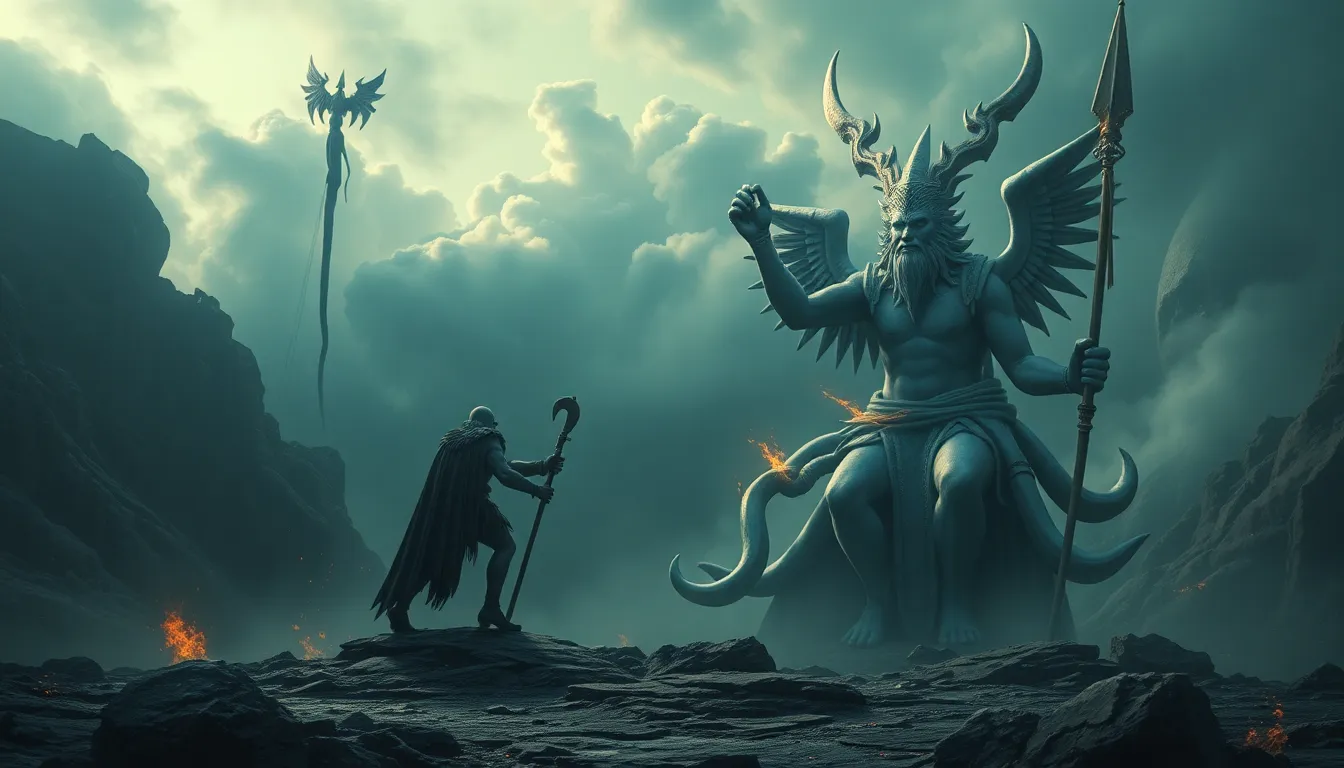The Price of Offending the Gods: Legendary Myths Explored
I. Introduction to Divine Retribution
Divine retribution is a powerful concept present in many mythologies, where gods or supernatural forces punish mortals for their transgressions. This idea serves as a warning against hubris and moral failings, emphasizing the need for humility and respect towards the divine.
Understanding these myths within their cultural context is crucial, as they reflect the values, fears, and aspirations of the societies that created them. This article explores various mythologies, examining how the theme of offending the gods manifests across different cultures and what lessons can be drawn from these tales.
In the following sections, we will delve into specific examples from Greek, Norse, Hindu, Egyptian, and Indigenous mythologies, and analyze how these narratives shape our understanding of morality and ethics.
II. The Concept of Offending the Gods in Various Cultures
Across diverse cultures, the theme of offending the gods appears with striking similarities. Here are some common elements:
- Hubris: Excessive pride or self-confidence is often seen as a direct challenge to the divine order, leading to severe punishment.
- Offerings and Rituals: Many cultures emphasize the importance of rituals and offerings to appease the gods, reinforcing the belief that divine favor must be earned.
- Moral Lessons: Myths often serve as cautionary tales, teaching communities about the consequences of defiance and the importance of maintaining respect for the divine.
III. Greek Mythology: The Wrath of the Olympians
In Greek mythology, the Olympian gods are known for their fierce retribution against mortals who offend them.
A. Case Study: Arachne and the Punishment of Hubris
The story of Arachne, a talented weaver, illustrates the peril of arrogance. Arachne boasted that her skills surpassed those of Athena, the goddess of wisdom and crafts. Enraged by her hubris, Athena transformed Arachne into a spider, condemning her to weave for eternity. This tale underscores the idea that challenging the gods can lead to dire consequences.
B. The Tragic Fate of Prometheus
Another notable example is Prometheus, who defied Zeus by stealing fire for humanity. As punishment, Zeus had Prometheus bound to a rock where an eagle would eat his liver daily, only for it to regenerate each night. This myth emphasizes the theme of suffering for the greater good and highlights the complexity of divine justice.
C. Lessons Learned from Greek Tales of Divine Retribution
From these stories, we learn that hubris invites divine wrath, and that respect for the gods is essential for harmony. Greek myths often reflect the consequences of human actions, serving as moral guides for society.
IV. Norse Mythology: The Consequences of Defiance
Norse mythology presents a different perspective on divine retribution, primarily through tales of chaos and fate.
A. The Story of Loki and the Chaos He Brings
Loki, the trickster god, embodies defiance against the established order. His actions lead to significant chaos, culminating in the death of Balder, the beloved god. Loki’s ultimate punishment—being bound and tormented—is a clear reflection of the Norse belief in the necessity of order and the consequences of defying it.
B. The Downfall of the Gods During Ragnarök
Ragnarök, the prophesied end of the world, showcases the catastrophic results of divine conflict and human folly. The gods face their demise in a battle against their enemies, illustrating that even the mightiest must face the consequences of their actions.
C. The Moral Implications of Defying Fate
Norse myths emphasize the inevitability of fate, suggesting that attempting to alter one’s destiny can lead to disastrous outcomes. This highlights a deep respect for the cosmic order and the limits of human influence.
V. Hindu Mythology: The Balance of Dharma and Adharma
In Hindu mythology, the concepts of dharma (righteousness) and adharma (unrighteousness) play a crucial role in understanding divine retribution.
A. The Story of Ravana and the Price of Arrogance
Ravana, the ten-headed king of Lanka, represents arrogance and ego. His abduction of Sita, the wife of Lord Rama, leads to his downfall. The epic Ramayana illustrates that failing to adhere to dharma results in severe consequences.
B. The Role of Karma in Divine Justice
Karma serves as a fundamental principle in Hindu thought, where actions have repercussions that extend beyond a single lifetime. This cyclical nature of offense and retribution reinforces the importance of moral behavior and respect for divine order.
C. The Cyclical Nature of Offense and Retribution
Hindu mythology teaches that offenses against the divine can lead to cycles of suffering, urging individuals to pursue righteousness to break the cycle and attain spiritual liberation.
VI. Egyptian Mythology: The Judgment of the Dead
In Egyptian mythology, the concept of divine retribution is closely tied to the afterlife and moral judgment.
A. The Significance of Ma’at and Cosmic Order
Ma’at represents truth, balance, and cosmic order. Egyptians believed that maintaining Ma’at was essential for harmony in the universe and the favor of the gods.
B. The Fate of Those Who Offend the Gods
Those who lived immorally faced dire consequences in the afterlife. The weighing of the heart against the feather of Ma’at determined one’s fate, embodying the moral lesson that wrongdoing leads to punishment.
C. The Weighing of the Heart: A Moral Lesson
This ritual symbolizes the importance of living a life of integrity. Offending the gods through immoral actions results in eternal damnation or annihilation, reinforcing the need for ethical behavior.
VII. Indigenous Myths: Nature’s Wrath and Spiritual Harmony
Indigenous mythologies often emphasize the interconnectedness of humans and nature, highlighting the consequences of offending nature spirits.
A. The Connection Between Humans and Nature in Indigenous Narratives
Indigenous cultures view the natural world as sacred, and their myths often reflect a deep respect for the environment and its spirits.
B. Examples of Offending Nature Spirits and Their Consequences
Many tales warn against actions that disrupt the balance of nature, such as overhunting or pollution. Offending these spirits can lead to natural disasters or personal misfortune.
C. The Importance of Rituals in Maintaining Balance
Rituals play a crucial role in appeasing nature spirits and maintaining harmony. These practices ensure that communities live in accordance with the natural world, fostering respect and sustainability.
VIII. Modern Interpretations of Ancient Myths
Contemporary society often reinterprets ancient myths, exploring themes of divine retribution and morality in new contexts.
A. How Contemporary Society Views Divine Retribution
Many modern narratives reflect the belief that actions have consequences, echoing the lessons of ancient myths.
B. Adaptations in Literature and Film
Mythological themes have been adapted in literature and film, showcasing the timeless nature of these stories. Works like Rick Riordan’s “Percy Jackson” series and films such as “Clash of the Titans” bring these ancient tales to modern audiences.
C. The Relevance of These Myths in Today’s Moral Discussions
These myths continue to provoke thought regarding morality, ethics, and the consequences of human actions, offering insights into human nature and society.
IX. Lessons from Legendary Myths: Moral and Ethical Implications
Legendary myths impart essential lessons that resonate across cultures and time periods.
A. The Enduring Message of Humility and Respect
One of the most significant messages is the importance of humility and respect towards the divine and the natural world. Myths encourage individuals to recognize their limitations.
B. How Myths Shape Cultural Values and Behaviors
Myths have a profound impact on cultural values, influencing behaviors and societal norms. They serve as a framework for understanding right and wrong.
C. Encouraging Reflection on Personal Actions and Consequences</h



